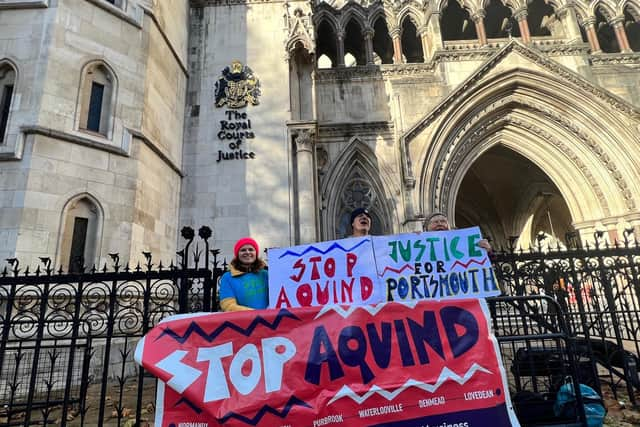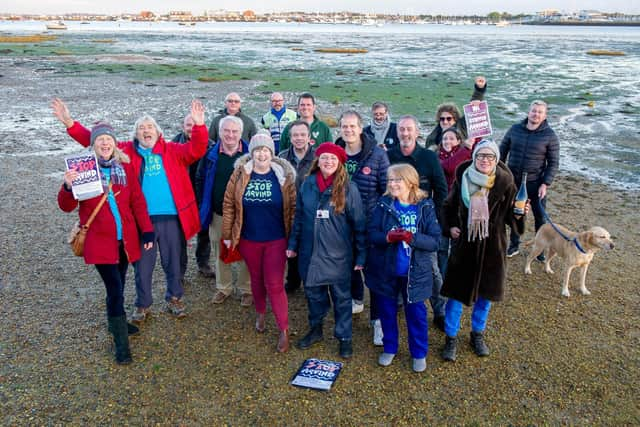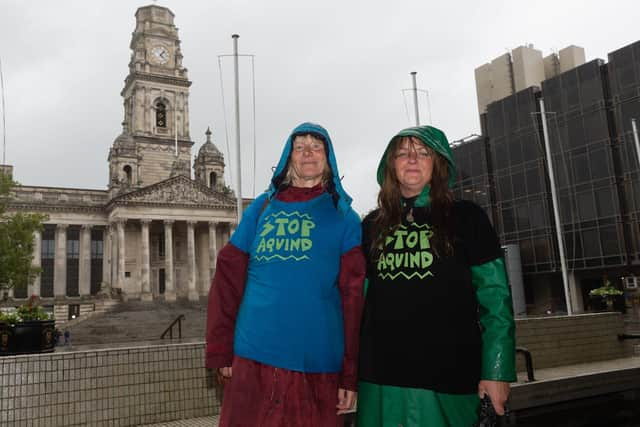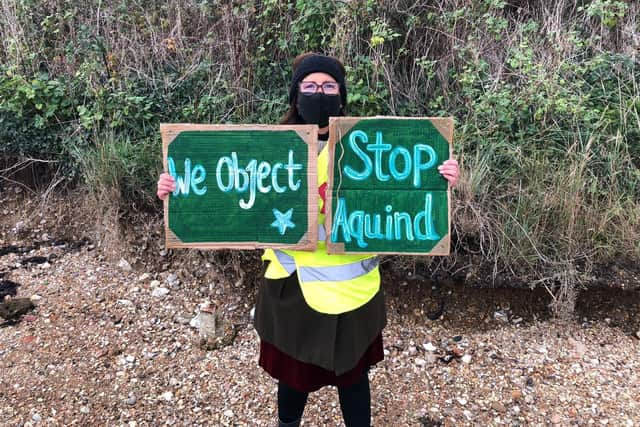Aquind hearing: Portsmouth activists line streets outside London court as it considers repealing Kwasi Kwarteng's decision to scrap £1.1bn energy project
and live on Freeview channel 276
The court hearing follows a five-year campaign by city residents to stop a £1.1bn energy interconnector that would link France and the UK via Portsmouth.
The plan – which threatens allotments, beloved natural habitats, and national heritage sites – has drawn together residents, environmentalists, and politicians of every party across the city, while The News has won a nationwide award for its campaigning coverage.
Advertisement
Hide AdAdvertisement
Hide AdFormer business secretary Kwasi Kwarteng turned down the scheme last year – but now lawyers representing the Aquind project hope to restart the plans in a legal fight over the government’s decision.


Poring over the documentation that was presented to the former business secretary, Mr Simon Bird KC, for Aquind, argued that the decision had been ‘unstructured, unreasoned, and unlawful’ – and initially his words seemed to resonate with judge Nathalie Lieven.
The secretary of state had rejected the proposal on the ‘misapprehension’ that there existed a suitable alternative route leading to Mannington energy substation, according to Mr Bird. The lawyer said the axing of a windfarm in Navitus Bay near Dorset had cleared the way to the substation – but not resolved other issues, including capacity and required improvements.
The barrister said: ‘Mannington was the only reason for the rejection of the proposed development (in Portsmouth). The secretary of state was deprived of understanding the full context. Six other subsections had been rejected for the same reason but (that) has not been raised by the secretary of state. It’s clear that Mannington wasn’t suitable for a variety of reasons. It was absolutely clear that it was a dead duck.’
Advertisement
Hide AdAdvertisement
Hide Ad

To the disquiet of campaigners, it appeared that Mrs Justice Lieven had quickly caught the argument presented by Aquind’s lawyer.
Addressing Mr Bird and reflecting on Mr Kwarteng’s thinking, she said: ‘It feels like scrambling around for a reason for refusal. And you would think that he would have to get his facts right.’
Mr Bird added: ‘It cried out for correct factual information given the urgency of the national need.’
But the judge said a developer had to be ‘pretty slow’ not to realise the importance of clear, correct information so late into a project with national security implications.


Addressing Mr Bird, Mrs Justice Lieven said: ‘It seems to me the important error here is (the idea) that Mannington was a runner since Navitus Bay was out of the picture.
Advertisement
Hide AdAdvertisement
Hide Ad‘I think your clients were pretty slow on the uptake. It’s not difficult to figure out where the secretary of state was going with this - that the secretary of state was looking around Mannington. I do think it was pretty obvious. You did know that he was deeply interested in Mannington. You were given full knowledge of that.
‘This is about information the decision maker had.’
And key information about alternative plans should have been ‘front-loaded’ in the presentation to the government, according to Mr James Strachan KC, arguing for the government’s decision to be upheld.


The lawyer said Mr Kwarteng had applied ‘legitimate’ and ‘proper’ scrutiny to the plans – and had simply disagreed with Aquind’s assessment of alternative substations.
A National Grid assessment discounted seven out of 10 substations – including Mannington – on ‘non-specific issues’ and failed to distinguish the Dorset site as beyond reappraisal, according to Mr Strachan.
Advertisement
Hide AdAdvertisement
Hide AdAddressing the evidence before the government, he said: ‘It doesn’t tell you why Mannington was discounted.
‘(There was) no other information about what was going into that process.
‘Focus on Mannington was entirely reasonable based on the evidence presented.’
As the hearing moves into its second day, Mrs Justice Lieven said it was ‘obvious’ that there remained questions about the condition and requirements of Mannington, a small substation that may spark another campaign of people power.


Representing the movement that has spent years energising Portsmouth residents against the Aquind project, activists from campaign group Stop Aquind demonstrated outside the Royal Courts of Justice all day.
Viola Langley said: ‘We won’t stop. We will continue. The plans just don’t make sense.’

